
Otto Ludwig Preminger was an Austrian-American theatre and film director, film producer, and actor. He directed more than 35 feature films in a five-decade career after leaving the theatre. He first gained attention for film noir mysteries such as Laura (1944) and Fallen Angel (1945), while in the 1950s and 1960s, he directed high-profile adaptations of popular novels and stage works. Several of these later films pushed the boundaries of censorship by dealing with themes which were then taboo in Hollywood, such as drug addiction, rape and homosexuality. He was twice nominated for the Academy Award for Best Director. He also had several acting roles.

Laura is a 1944 American film noir produced and directed by Otto Preminger. It stars Gene Tierney and Dana Andrews, along with Clifton Webb, Vincent Price, and Judith Anderson. The screenplay by Jay Dratler, Samuel Hoffenstein, and Betty Reinhardt is based on the 1943 novel Laura by Vera Caspary. Laura received five nominations for the Academy Awards, including for Best Director, winning for Best Black and White Cinematography. In 1999, Laura was selected for preservation in the United States National Film Registry by the Library of Congress as being "culturally, historically, or aesthetically significant". The American Film Institute named it one of the 10 best mystery films of all time, and it also appears on Roger Ebert's "Great Movies" series.

A Letter to Three Wives is a 1949 American romantic drama directed by Joseph L. Mankiewicz and starring Jeanne Crain, Linda Darnell and Ann Sothern. The film was adapted by Vera Caspary and written for the screen by Mankiewicz from A Letter to Five Wives, a story by John Klempner that appeared in Cosmopolitan, based on Klempner's 1945 novel.
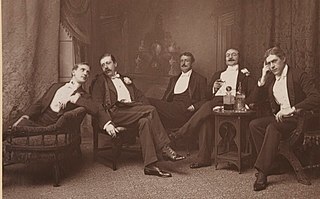
Lady Windermere's Fan, A Play About a Good Woman is a four-act comedy by Oscar Wilde, first performed on Saturday, 20 February 1892, at the St James's Theatre in London.
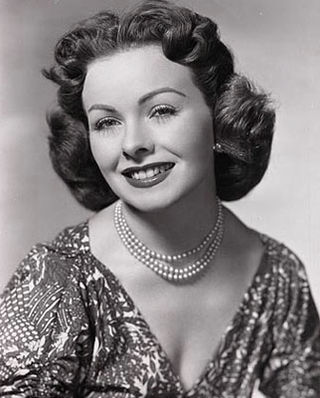
Jeanne Elizabeth Crain was an American actress. She was nominated for an Academy Award for Best Actress for her title role in Pinky (1949). She also starred in the films In the Meantime, Darling (1944), State Fair (1945), Leave Her to Heaven (1945), Centennial Summer (1946), Margie (1946), Apartment for Peggy (1948), A Letter to Three Wives (1949), Cheaper by the Dozen (1950), People Will Talk (1951), Man Without a Star (1955), Gentlemen Marry Brunettes (1955), The Fastest Gun Alive (1956), and The Joker Is Wild (1957).

An Ideal Husband is a four-act play by Oscar Wilde that revolves around blackmail and political corruption, and touches on the themes of public and private honour. It was first produced at the Haymarket Theatre, London in 1895 and ran for 124 performances. It has been revived in many theatre productions and adapted for the cinema, radio and television.

River of No Return is a 1954 American Western musical film directed by Otto Preminger and starring Robert Mitchum and Marilyn Monroe. The screenplay by Frank Fenton is based on a story by Louis Lantz, who borrowed his premise from the 1948 Italian film Bicycle Thieves. The picture was shot on location in the Canadian Rockies in Technicolor and CinemaScope and released by 20th Century Fox.

A Good Woman is a 2004 romantic comedy drama film directed by Mike Barker. The screenplay by Howard Himelstein is based on the 1892 play Lady Windermere's Fan by Oscar Wilde. It is the fourth screen version of the work, following a 1916 silent film using Wilde's original title, Ernst Lubitsch's 1925 version, and Otto Preminger's 1949 adaptation entitled The Fan.
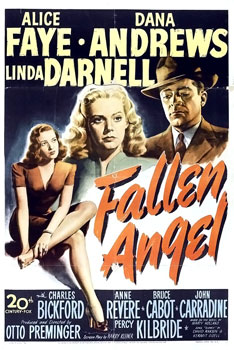
Fallen Angel is a 1945 American film noir directed by Otto Preminger, with cinematography by Joseph LaShelle, who had also worked with Preminger on Laura a year before. The film features Alice Faye, Dana Andrews, Linda Darnell and Charles Bickford. Fallen Angel was Faye's last film as a major Hollywood star, and she did not appear in another film until State Fair (1962).

After the Ball is a musical by Noël Coward based on the 1892 play by Oscar Wilde, Lady Windermere's Fan.
The Model and the Marriage Broker is a 1951 American romantic comedy film starring Jeanne Crain, Scott Brady, and Thelma Ritter. Directed by George Cukor and produced by Charles Brackett, the picture effectively features Ritter in a rare lead role as the marriage broker.
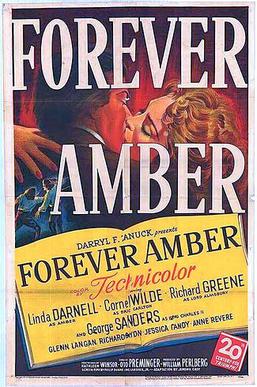
Forever Amber is a 1947 American romantic historical drama film starring Linda Darnell and Cornel Wilde. It was based on the book of the same title by Kathleen Winsor. It also starred Richard Greene, George Sanders, Glenn Langan, Richard Haydn, and Jessica Tandy.
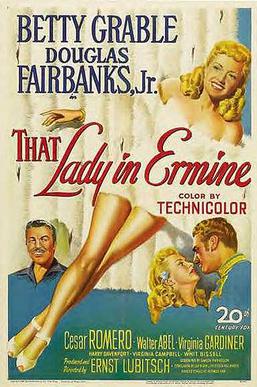
That Lady in Ermine is a 1948 American Technicolor musical film directed by Ernst Lubitsch. The screenplay by Samson Raphaelson is based on the 1919 operetta Die Frau im Hermelin by Rudolph Schanzer and Ernst Welisch.

In the Meantime, Darling is a 1944 American drama film produced and directed by Otto Preminger. The screenplay by Arthur Kober and Michael Uris focuses on a wealthy war bride who is forced to adjust to living in spartan conditions in military housing during World War II.

Under Your Spell is a 1936 American romantic comedy film with music directed by Otto Preminger. The screenplay by Frances Hyland and Saul Elkins is based on a story by Sy Bartlett and Bernice Mason. It was a remake of the American Spanish-language film, Las fronteras del amor.

Lady Windermere's Fan is a 1944 Mexican drama film directed by Juan José Ortega and starring Susana Guízar, Anita Blanch and René Cardona. The film's sets were designed by the art director Ramón Rodríguez Granada. It is based on the 1892 play Lady Windermere's Fan by Oscar Wilde.

Lady Windermere's Fan is a 1925 American silent drama film directed by Ernst Lubitsch. It is based on Oscar Wilde's 1892 play Lady Windermere's Fan which was first played in America by Julia Arthur as Lady Windermere and Maurice Barrymore as Lord Darlington. The film is being preserved by several archives. It was transferred onto 16mm film by Associated Artists Productions in the 1950s and shown on television. In 2002, Lady Windermere's Fan was selected for preservation in the United States National Film Registry by the Library of Congress, being deemed "culturally, historically, or aesthetically significant."
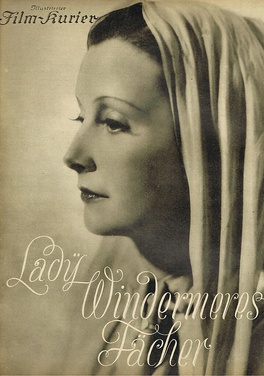
Lady Windermere's Fan is a 1935 German comedy film directed by Heinz Hilpert and starring Lil Dagover, Walter Rilla and Aribert Wäscher. It is based on the play Lady Windermere's Fan by Oscar Wilde. The film's sets were designed by the art directors Heinrich Beisenherz and Ludwig Reiber.

Lady Windermere's Fan is a 1916 British silent comedy film directed by Fred Paul and starring Milton Rosmer, Netta Westcott and Nigel Playfair. It was the first film adaptation of Oscar Wilde's 1892 play Lady Windermere's Fan. A print of the film still exists and it has been released on DVD by the British Film Institute.
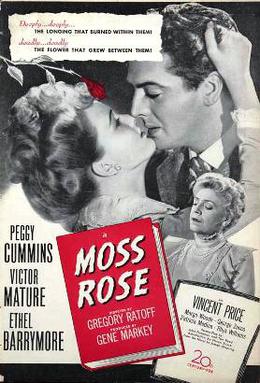
Moss Rose is a 1947 American film noir mystery film directed by Gregory Ratoff and starring Peggy Cummins, Victor Mature and Ethel Barrymore. It is an adaptation of the 1934 novel Moss Rose by Marjorie Bowen based on a real-life Victorian murder case.


















